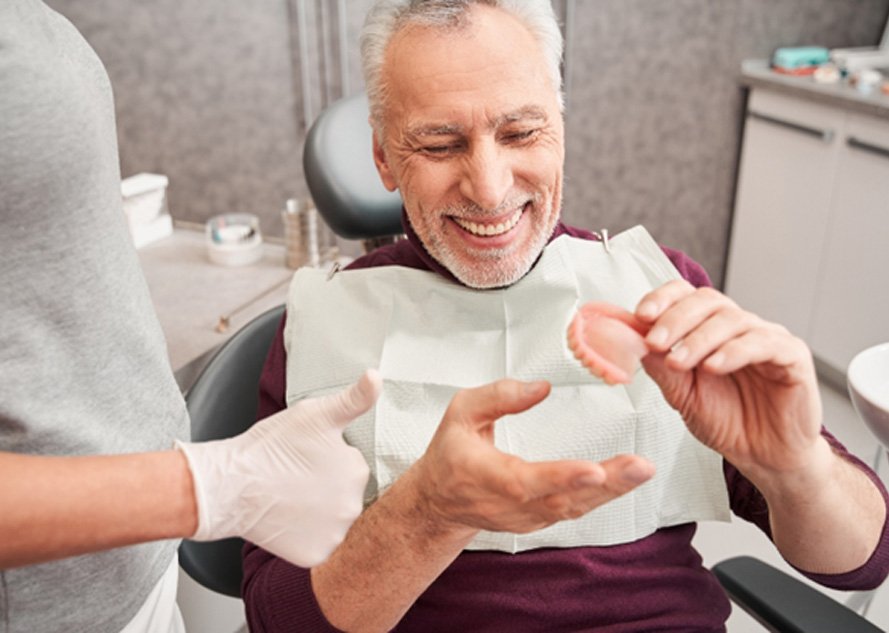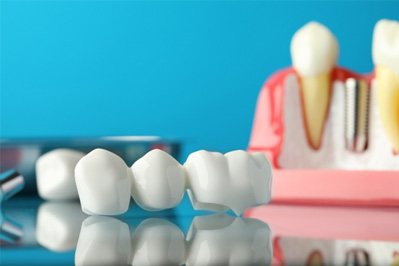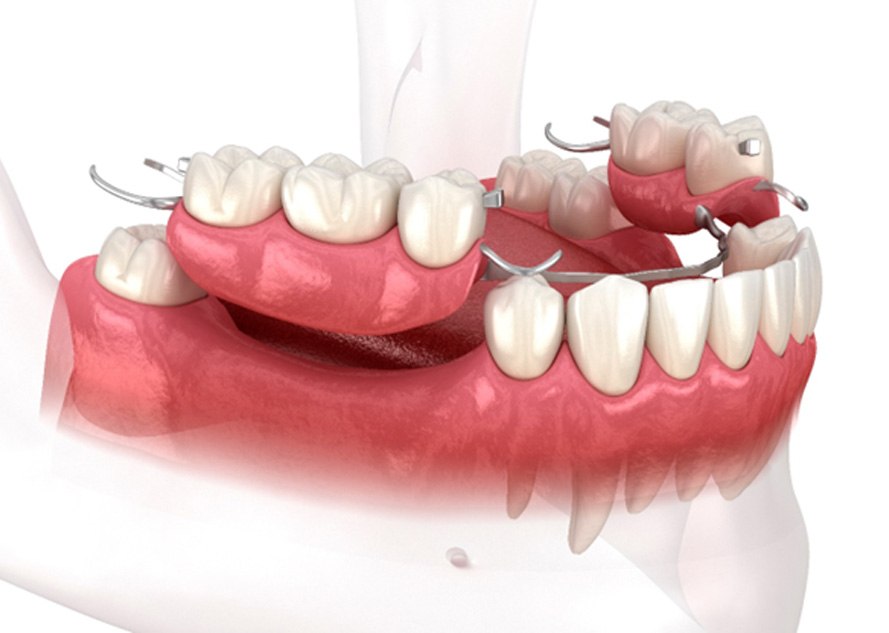Dentures – Baytown, TX
A Second Chance for a New Smile

Missing teeth have a way of making life more difficult. Everyday tasks become more challenging, and your self-esteem begins to decline. But it doesn’t have to be your reality if you choose dentures in Baytown. As custom-made prosthetics designed to fill in gaps and restore appearances, dentures make it possible to eat delicious foods, speak freely with confidence, and embrace a more youthful smile. At Baytown Gentle Dental, our team of professionals is here to help you take the next step, so don’t hesitate to call us to schedule an appointment.
Who’s a Good Candidate for Dentures?

Ultimately, it doesn’t take much to be a good dentures candidate. Almost anyone who’s missing teeth can get the prosthetics. That said, you’ll still need to consult Dr. Seif before getting treatment. He can determine whether (or not) you’re eligible for dentures. Even if you’re not, you can qualify later by getting preliminary dental work. Other tooth replacement options are also available. If you’d like to learn more, just keep reading or call us for the details.
Effects of Missing Teeth

As you consider denture candidacy, you should also review tooth loss’ causes and effects. Doing so will help you see how new teeth could help.
Typically, tooth loss occurs for many possible reasons. One such cause is gum disease, which can erode the tissues supporting your teeth. Alternatively, tooth decay can rot teeth such that they fall out or need extraction. Your pearly whites could also get knocked out by an injury or accident.
Unlike the causes, tooth loss’ effects are narrow but severe. It makes eating, speaking, and smiling hard by depriving you of teeth. The condition also leads to smile gaps, degrading your jawbone. (This erosion can cause facial collapse if left untreated.) Adding insult to injury, the same spaces could make your remaining teeth tilt and fall out.
What Qualifies You for Dentures?

As stated before, most patients can get dentures if they lack teeth. Still, there are other factors worth examining.
How many teeth you’ve lost is one such matter. Based on the number, you could get one of two possible dentures. The first is the partial denture, which only replaces a few teeth. On the other hand, the second is the full denture – a type used when all pearly whites on an arch are gone.
Your overall oral health is another concern. You see, dentures won’t work well if your mouth is too unhealthy. Gum and jaw tissues must be sturdy to support dentures. If they aren’t, the prosthetics won’t stay in place or act reliably.
Lest you forget, your budget is a big factor as well. The truth is that dentures are (usually) the cheapest restorations. As such, they’re the ideal option for patients with limited funds.
Alternative Tooth-Replacement Options

To be clear, you still have options if you’re not a good dentures candidate. Our office offers several other restorative treatments. These include:
- Dental Bridges – A dental bridge is a fixed restoration, usually made of crowns fused to a pontic. That being the case, it’s best used to replace one to four teeth. The appliance needs nearby healthy teeth for support and is normally cemented in place.
- Dental Implants – Unlike other tooth replacements, dental implants are set in your jawbone. That means they fuse with your jaw gradually. In doing so, they become secure and permanent parts of your mouth. (Given these features, though, implants can be a tad expensive.)
Types of Dentures

When it comes to discussing which type of denture you can expect to receive, your denture dentist will explain the difference between full, partial, and implant dentures.
Partial Dentures
Made of acrylic and a metal framework, partial dentures attach to regular, healthy teeth to stay in place. Artificial teeth are placed on top of the acrylic, gum-colored base to fill in the gaps along an arch. When positioned, it works similar to a puzzle piece, allowing it to blend seamlessly with the rest of your smile.
Full Dentures
Designed much in the same way as partial dentures, the one difference is that there is no metal framework with full dentures. Instead, acrylic, gum-colored bases are created with artificial teeth carefully crafted and positioned on top of the denture base. They remain secured with the help of natural suction and denture adhesive, which is especially helpful when attempting to eat or speak.
Implant Dentures
Complete with titanium posts that mimic the functionality of tooth roots, implant dentures are affixed to the jawbone, fusing over time through a process referred to as osseointegration. Between four and six implant posts are placed along an arch and support a customized denture that is secured on top for optimal use and aesthetics.
How Dentures are Made

Every mouth is different, so when you get dentures, a number of steps will need to be taken in order to ensure that the final prosthesis fits properly and looks natural. If you are interested in learning more about how your replacement teeth will be made, we’re here to help! Below is a quick overview of the materials that can be used to make dentures as well as a step-by-step breakdown of the creation process.
What are Dentures Made Of?

You will naturally want your prosthesis to look as lifelike as possible. To that end, the teeth of your dentures will likely be made out of porcelain. This material can very closely match the appearance of real tooth enamel, and it’s also notable for its durability.
The base of the dentures can be made from a few different materials. Acrylic is a particularly noteworthy choice thanks to its ability to blend in with your gum tissues. Note that partial dentures can have an acrylic base along with metal clasps that help keep them in place while you’re wearing them.
The Denture Creation Process

So what steps are involved in making dentures? Here’s a brief summary:
- We’ll create a model of your mouth based on impressions of your gums. In some cases, we may also take the time to measure your jaw.
- The model created in the previous step will be sent to a trusted dental laboratory. There, trained experts will make a replica of your gum line out of wax. Artificial teeth will be carefully placed into the wax with the help of an articulator.
- At this point, the lab will send us the wax dentures so that we can confirm that they fit properly in your mouth. If they do, they will be sent back to the lab so that the process can continue. (Note that you will be given temporary dentures to wear while you’re waiting for the final versions.)
- The next step is to melt the wax base away. This is accomplished by putting the dentures in a flask that is subsequently immersed in hot water. Plaster will be used to help the dentures keep their shape even after the wax portions are gone.
- Acrylic is injected into the flask so it can act as a new base. Once that’s done, any remaining plaster will be removed with the aid of an ultrasonic bath.
- Once the completed dentures have been properly trimmed and polished, they will be sent back to our office so that a final fitting can be performed.
Adjusting to Your New Dentures

When you first get your new dentures, your mouth may be a little sore, and you may have some difficulty when it comes to speaking and chewing. Our team will be happy to give you some tips that can make the adjustment process easier; for example, we may suggest only eating soft foods for the time being and performing certain exercises for your facial muscles. Eventually, your mouth should get used to the presence of dentures. Remember that you can always contact us if the discomfort seems to last longer than it should.
The Benefits of Dentures

The benefits of dentures are many yet, you may not fully understand the extent to which these dentures can improve your life. You can expect that our team will share deeper insight into the advantages of these prosthetics so that you can feel more confident moving forward with treatment. Here are just some of the most popular benefits of dentures.
Psychological Benefits

Tooth loss can be a difficult reality to accept. Many people who have lost most of or all of their teeth experience negative effects on their self-esteem, resulting in higher levels of sadness and depression. By restoring your smile with dentures, you can improve how you feel and how you look. This will reduce anxieties about your appearance, speech, chewing ability, and more.
Clearer Enunciation

Producing certain sounds and saying some words can be a challenge when you have gaps in your smile. To enunciate properly, your lips and tongue need to be positioned properly. When you are missing teeth, your tongue isn’t in the ideal position, making it difficult to say certain words. Since dentures act like missing teeth, they allow you to speak more clearly.
Improves Nutrition

Lots of nutrient-dense foods are tough in texture, like protein, fruits, and veggies. If you can’t chew your food properly, your eating habits may be negatively affected. Dentures make it easier to bite and chew healthy foods, allowing you to enjoy a nutritious diet and promote your overall health.
Preserves Oral Health

If you still have healthy natural teeth, dentures can help to keep them in ideal condition. By filling in these gaps with a partial denture, you can keep your teeth securely in place. Dentures also help to support the weight of routine chewing, reducing wear and tear of the natural teeth over time.
Expands Opportunities

When you attend interviews, negotiate sales, attend social events, making an excellent first impression is key. Your smile is one of the first things that people notice about you, so having one that appears healthy does nothing but help. Studies have shown that the probability of being employed is negatively associated with poor oral health.
Understanding the Cost of Dentures

The price of your new dentures will vary depending on a variety of factors, including the number of teeth you’re replacing, your oral health, and the type of prosthetic you choose. Because no two smiles are identical, the best way to get an exact cost estimate is to schedule a consultation at Baytown Gentle Dental and discuss your options with Dr. Seif. In the meantime, please feel free to review the information below about how we determine the cost of dentures.
Factors that Affect the Cost of Dentures

There are typically three major factors that influence the cost of a new pair of dentures. These include:
- Preliminary treatments or preparation needed before your new denture can be worn, such as if you need any teeth extracted or gum disease treatment.
- The type of acrylic used for your denture base (this is the portion that is dyed to match the color of your gum tissue).
- The type of replacement teeth you select. These are usually made from either acrylic or porcelain. It is important for them to be both lifelike and durable.
Furthermore, it’s important to remember that when it comes to your dentures the cheapest option is not ideal. With so-called “discount” dentures, it is likely that you’ll receive poor quality acrylic teeth, and when it comes to what goes in your mouth, quality is extremely important!
Are Implant Dentures More Expensive?

Yes, implant dentures are more expensive than traditional dentures, but this is for good reason. Implant dentures are permanent restorations that secure to your mouth via four to six dental implant posts. This makes them more durable and eliminates problems common with traditional dentures such as denture sores, slipping, and complicated care and maintenance. They also provide much greater biteforce, allowing you to eat a more expansive and healthy diet.
Although they do cost more up front, dental implants are an investment that will pay dividends over time. That’s because unlike traditional dentures, they won’t need to be replaced every five to seven years, and they are less likely to become damaged due to dropping or drying out.
Does Dental Insurance Cover Dentures?

Yes. Because most dental insurance plans consider dentures a major procedure, they generally offer around 50 percent coverage for these prosthetics, although it is important that you verify this with your induvial plan first, as all plans are different. At Baytown Gentle Dental, our team will be happy to help you confirm your specific benefits before your treatment begins.
Other Options for Making Dentures Affordable

In addition to welcoming dental insurance, we are also pleased to accept flexible financing through our preferred lenders, CareCredit and Lending Club. These third-party lenders offer patients the ability to break up the cost of their denture treatment into multiple, low-to-no-interest monthly payments that are often better suited to their budget. To learn more about these programs, please visit our website.
I Need a Checkup & Cleaning I Need a Dentist for My Child I am Concerned About Bleeding Gums I Have a Cavity or Broken Tooth I am Missing One or More Teeth I Want to Enhance My Smile I am Scared of the Dentist I am in Pain & Need Help I am Concerned About Sleep Apnea View Our Services




